At RIPE 79, precisely on the 20th anniversary of his taking charge at the RIPE NCC, Axel announced that he would be stepping down. In his last week at the office, Axel shares some of his thoughts, looking back at his two decades as Managing Director.
What was your first week at the RIPE NCC like?
It was a long time ago… I have two clear sets of memories. One is of my starting day - I actually went to Schiphol for a General Meeting and Board Meeting with a lot of people who I didn’t know. And then the other is coming to the old office at Singel, walking up the stairs through this long hallway which would, in a way, become my home for so many years.
Meeting curious new faces - they also didn’t know who was coming there and what was going to happen. I didn’t know anybody except Daniel Karrenberg and Paul Rendek. So everything was new, I didn’t know what was waiting for me, I didn’t really know how to start the whole thing. I do remember that I called everyone together for a staff meeting, in the old big meeting room. We did fit in, with probably about 40 people. And I said, “Don’t panic, I’m new here, I don’t know anything, I’m not going to change anything quickly”, just to calm everyone down. What I heard later was that was probably the wrong thing to say and people wanted some change at the time.. and in the months and years to come we did, of course, change.
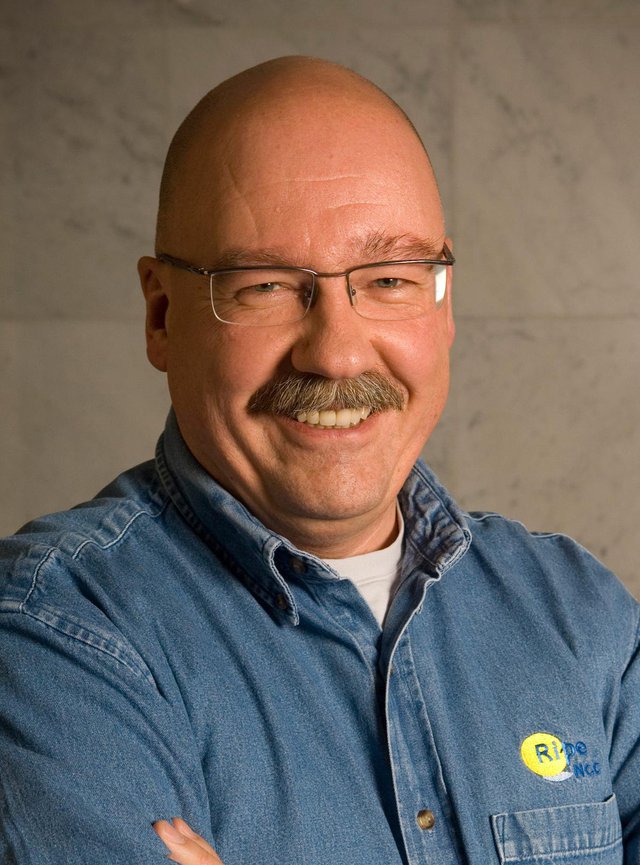
What did you think, back then, your biggest challenges were?
My biggest challenge was to make sense of the organisation. I’d been out of the business for a couple of years, and the Internet had sped up and grown. The biggest challenge on the inside was coming in and getting to know people, and seeing how things work. On the outside, those were the boom days of the Internet. Growth was very dramatic and within the NCC, we were overwhelmed. Registration services had a huge waiting list, people were waiting for two weeks just to get an acknowledgement that their request had come in. There were just not enough people. That was the first challenge we had – getting people in, getting them trained, and becoming more efficient in what we were doing. And getting rid of the queue. What I found remarkable was the support we still had from the community, by the members, understanding the problems and wanting to help us. Of course, we were also criticised for the waiting time, for not being able to give out resources quickly enough.
How have you seen the RIPE community change?
In the beginning, it was pretty much just the Internet Service Providers (ISPs) running networks and working together to make the Internet bigger. What I see now is that there are distinct factions of the community and membership. Some are still the ISPs of old – but there are large numbers of businesses, enterprises, and organisations that have nothing to do with running the Internet – they are using the Internet and have a little bit of infrastructure themselves. So that’s one of the effects of IPv4 run-out and having to come to the RIPE NCC to get a /22. There’s a shift in membership from the more technically-minded organisations to the more user-oriented ones.
What I also see is that there is less cohesion between members of the community. Of course back in 1999, we had fewer than 2,000 members and now we have more than 25,000. Of course it cannot be such a closely knit community anymore. There are many people out there for their own benefit instead of working for the common good. We see attempts at fraud and trickery and manipulation of policies to get their hands on the last /22 to be able to accumulate them, merge them and sell them for financial gain without having any interest in running networks. That’s a departure from what we saw in the old times. What I hope is that as we are about to have run out of IPv4 that that would go away or diminish – back to healthier communities.
One thing regarding the community and the developments within the community is the inclusiveness. We say we are open, we accept anybody with an interest in what we are doing. In the early years, we were very technically minded, and we said anybody could come. And people came who were not technically minded anymore, who had a strong interest in what we were doing and how the Internet would work in their economies – speaking of governments, regulators, police forces. That is also a success story – that they found us, that they dared to come, that they listened to us and that they are taking part in the policy development process. This is not a given – and it is a success for the RIPE NCC. This is also a challenge because that part of the community expects things from us that we can’t deliver, which makes clear communications, managing expectations and the like important.
How have you balanced the needs and demands of the RIPE community?
That’s something that’s fairly straightforward. A strong guidance for this is “The will of the members, the interest of the community”. We have tried very hard to listen to the community, to listen to the members, to what they want. What I find is a very good tool for that is the Activity Plan and Budget. And the whole cycle that we go through every year in writing that up – writing up what we think we should be doing the next year based on what we’ve heard before. And throwing that open to the community, having them read it, having them comment on it and in the end validate it by accepting it, by voting on the Charging Scheme. That I found fairly straightforward to do. If we occasionally had the tendency to go off the straight path, we would hear about it from the members and unless we were really stupid, we would listen to that and correct our course.
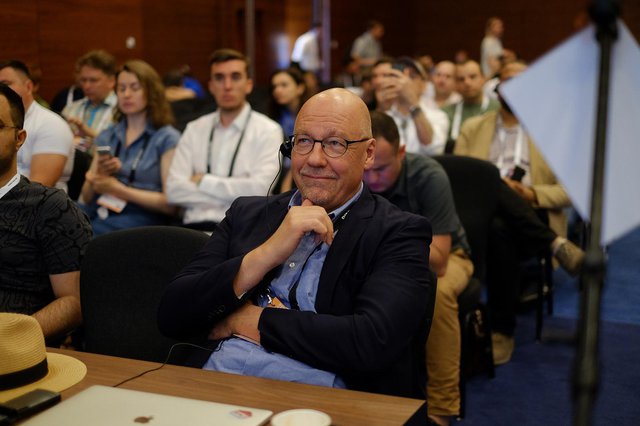
Enjoying a lighter moment at ENOG 16, Tbilisi
What did you think 2019 would look like back in 1999?
I had no idea where we would be. Five years in Internet time is a long time. I thought that probably we would still be around. I’ve had people comment to me early in the 2000s, “You just started this job, but don’t get used to it. All this bottom-up industry self-regulation thing will go away, because the governments will come in, barge in and take it over and you will be gone.” I thought, “That’s a strong opinion, and I don’t see that happening yet.” Yet years later, the governments came and they were interested, we put that interest in a direction that we felt both parties – the governments and the traditional parties – would benefit from and that developed into the Internet Governance Forum, and that has gone well over the past fifteen years. But I couldn’t foresee that in the year 2000. Then it was about Internet growth and we were just scrambling after that to fulfil the needs of our members.
What are the biggest changes you’ve seen in the Internet?
In the end, looking back – the Internet was a thing that was very email-based at the time. The web was there, but it was pretty much just on a computer, that you needed to sit down in front of. Now you have this thing in your pocket that is the Internet. And I see a large behavioural change, I’m glued to this thing for I don’t know how many hours – chatting with people, ordering stuff, booking AirBnb houses, banking, fixing my car. The Internet is much more pervasive in our lives than it was twenty years ago.
What do you see as some of the challenges facing the Internet today?
The biggest challenge for the Internet is not technology – we seem to have understood how it runs, and it runs quite well! On the technology side, maybe pervasive large attacks against parts of the infrastructure. The real threat comes from the fragmentation side, the political, regulatory side where we are covering 76 countries with diverse political views on human rights and freedom of speech. They have varied intents in controlling the Internet and what’s done on it. There are things happening in different countries that are not compatible with the way we are doing self-regulation and that is something that we need to be prepared for.
What are some of the NCC’s most notable achievements under your leadership?
The most notable achievement is that we are still doing what we set out to do – coordinating the community. Having a place that they can come together and discuss things – seeing the numbers at RIPE Meetings, they are quite significant – over 700. The main thing we’ve done in that area is branching out into regional meetings, instead of sticking to Amsterdam or western Europe all the time. When we started we had two meetings a year in Amsterdam, and one more somewhere else in western Europe mostly. Going and recognising the different needs in the different parts of the service region, notably in the beginning in the Middle East and then the former Soviet Union – Russia and the surrounding countries. Now we see other, smaller and more national-focused meetings in Eastern Europe and the Caucasus as well – that is a big achievement.
Another one on the technical side is the measurements – and RIPE Atlas – that has grown as we thought it would and it should. Of course at the start RIPE Atlas was a bit controversial. It was seen as something we did without communicating with our members about it. It wasn’t our intention, and we were criticised for it, and I’m glad that it has now turned out well and has significant support.
Something else we are working on and struggling with is making the data that we have accessible in an organised way – now I’m thinking of country reports and the like. We clearly see the challenge we have as technologists. We have the data, we accumulate it, but have an issue with making it available to non-technically minded people like governments and regulators. We’re working on that too, and seeing the need for it is also a bit of an achievement.
Is there any advice you’ve received that has helped shape your leadership, that you would like to pass on?
I have received so much advice, and lots of it is contradictory. It’s important that you form an opinion or work style that is somewhat independent of that. Form your own picture of what’s going on. And also trust the good people that are working for you. Do not try to overly control what’s going on. Delegate and don’t micro-manage.
“Do not micromanage” that is probably the biggest thing that I would share with my successor.
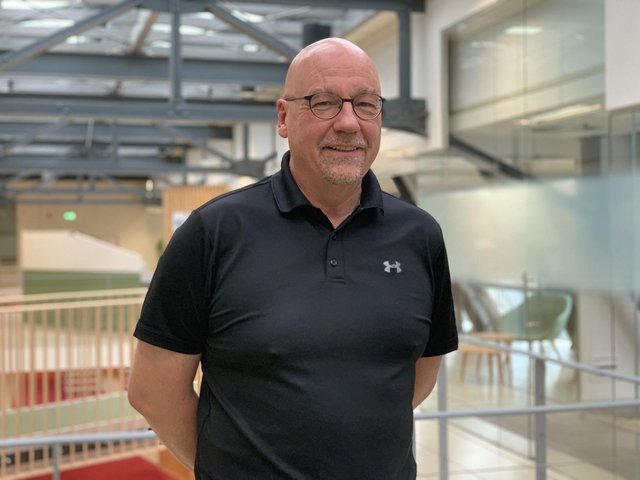
What were some of your most memorable moments at the RIPE NCC?
Coming to the first RIPE Meeting in Amsterdam – could have been RIPE 36. Just standing there, being the newly-appointed new guy. Seeing the sea of faces, a few I remembered from my previous life, but not too many. That very nicely turned around into a sea of friendly faces or friends over the years, and seeing the concern or the surprise when I announced my retreat was heart-warming. Obviously I have a bit of support in the community and it was great to hear at that moment. And one of my many favourite moments are the RIPE dinners and the convivial atmosphere there and just seeing the staff, members and community all having so much fun, while still at work – that’s one of my favourite moments.
On a closing note, I don’t know how I will survive without you guys – RIPE and the RIPE NCC, the community members, the staff have become so much a part of my life that I can’t imagine life without you.
At some point I will come back and become part of the community, but at this point, still sitting in the office, I don’t know how this will feel.
Will we see you on the mailing lists?
That’s also an interesting aspect – we always say we’re RIPE NCC staff, we’re neutral, we don’t have any opinions on policy and the like…now I could stand up and have an opinion, and we’ll see how that goes...

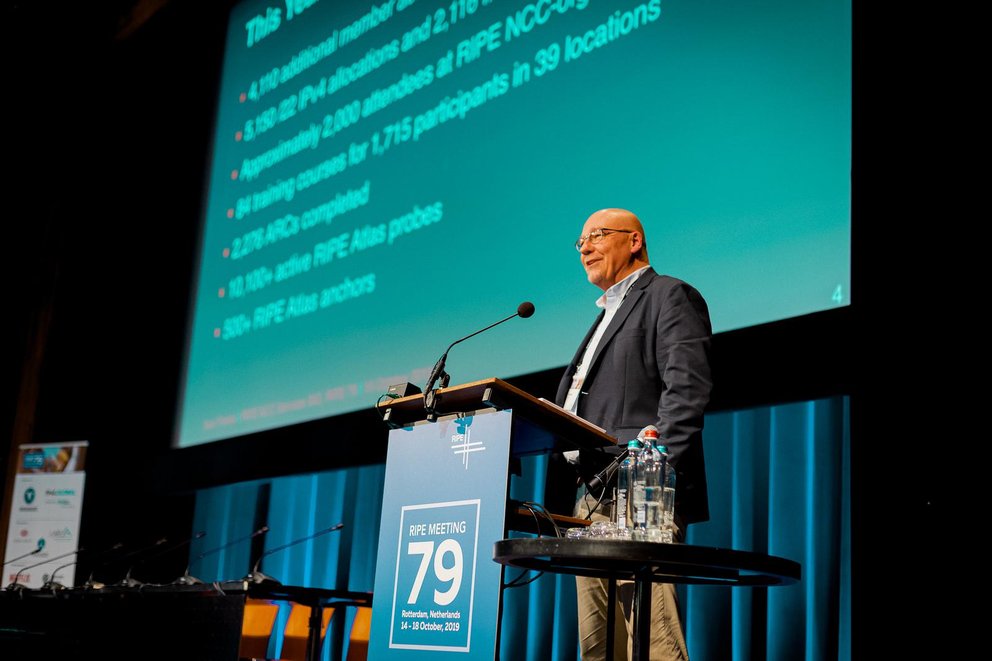
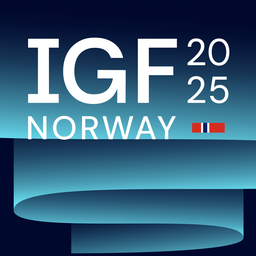
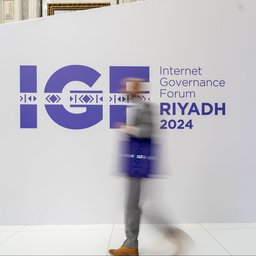
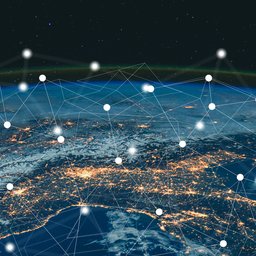
Comments 2
The comments section is closed for articles published more than a year ago. If you'd like to inform us of any issues, please contact us.
Jordi Palet Martinez •
Hi Axel, I can't let you go without saying this: Yes please, join the mailing list. Now that you will be non-staff (I always said that staff is also community and should be able to speak openly from a personal perspective + additional knowledge), you can contribute a lot with your "internal" knowledge of so many aspects that aren't easy to see from the community side. Thanks!
Kurt •
Although there is still a mystery around the real reason for you leaving the NCC, I wish you all the best for your future business life and in general. I found you a true friend and heartful defender of the Internet spirit that made the net so successful. Cheers, Axel!